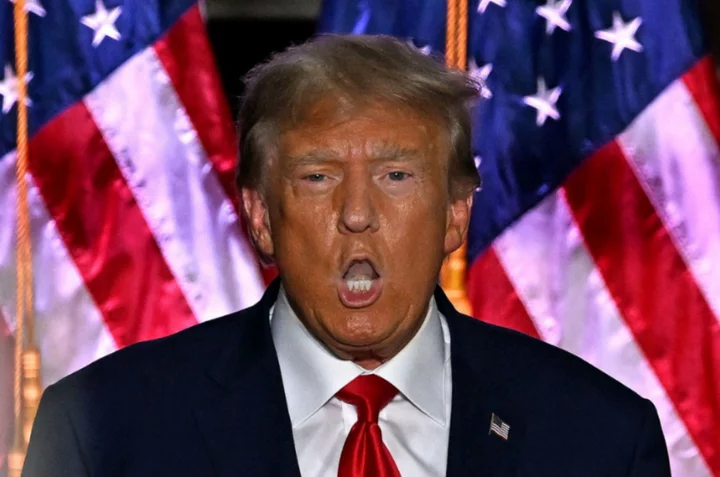
Trump indictment – live: Trump speech lambasted as ex-president celebrates 77th birthday post-arrest
Donald Trump is marking his 77th birthday today as the first current or former president arrested on federal criminal charges in American history. On Tuesday, Mr Trump pleaded not guilty at his arraignment in a Miami federal courthouse on 37 charges over his handling of classified national security documents after leaving the White House. Miami officials had braced for protests outside the courthouse but much of the Maga army of supporters failed to show up as expected. One anti-Trump protester jumped in front of the former president’s motorcade. After the hearing, Mr Trump stopped by the famous Cuban restaurant Versailles where supporters sang him ‘Happy Birthday’. He then flew back to his golf club in Bedminster, New Jersey, where he gave a speech launching into his usual unsubstantiated narrative that he is the victim of political persecution. In the remarks, he claimed that the boxes of classified documents discovered in his possession actually contained clothes. “They were containing all types of personal belongings – many, many things, shirts and shoes, everything,” he said as a bizarre explanation for why he wanted to hold onto them. The speech was widely lambasted by critics for its litany of falsehoods. Read More Desperate deflections, revenge plans – and a supplicant Fox News: What we learned from Trump speech Defiant Trump accuses ‘corrupt’ Biden of undermining democracy with ‘evil and heinous’ federal charges Trump addresses reason he refused to give back boxes saying they contained ‘shoes and shirts and everything’ Tucker Carlson blasts ‘filthy and decadent’ Trump aides who exploited his need for flattery
1970-01-01 08:00
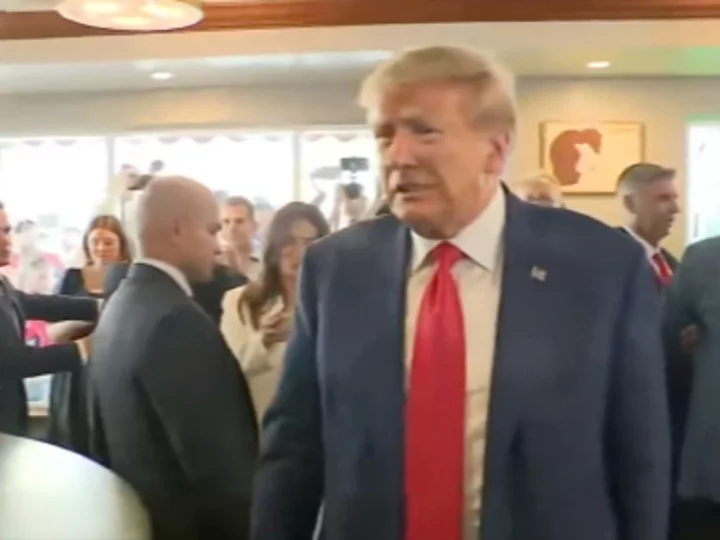
Trump stops at Versailles restaurant after his arrest where supporters pray over him and sing ‘Happy Birthday’
Donald Trump was met with a circus scene on Tuesday in Miami as he was in Florida to face 37 federal charges over his alleged mishandling of classified documents. In a packed restaurant in the Little Havana, supporters alternatively prayed over the ex-president and sang him happy birthday, in honour of his 77th birthday, which is on Wednesday. Mr Trump also posed for a photo with MMA fighter Jorge Masvidal and declared, “Food for everyone!” inspiring cheers from his fans. Earlier that day, Ms Trump was in a federal courthouse, where he pleaded not guilty to 37 charges related to his handling of government documents after leaving the White House. This is a breaking news story and will be updated with new information. Read More Ivanka and Jared split over attending Trump 2024 launch – follow live Why was Donald Trump impeached twice during his first term? Four big lies Trump told during his 2024 presidential announcement
1970-01-01 08:00
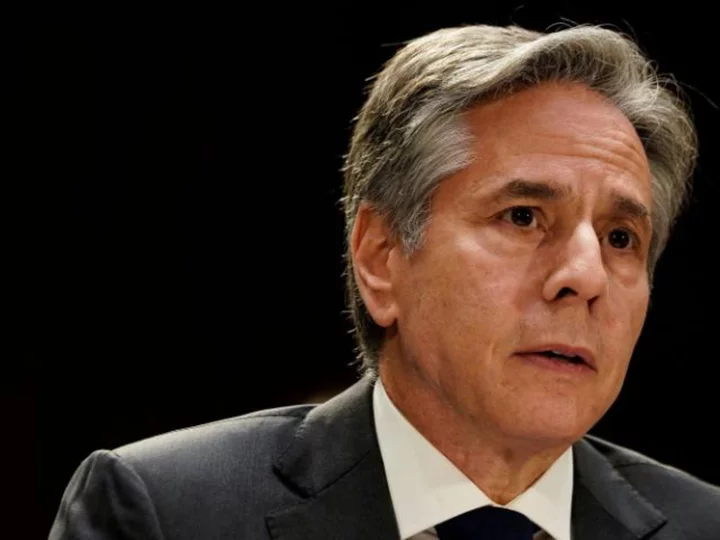
Blinken to travel to China this weekend
US Secretary of State Antony Blinken will travel to Beijing this weekend, the State Department announced on Wednesday -- a significant trip that comes as the Biden administration navigates its complicated relationship with China.
1970-01-01 08:00
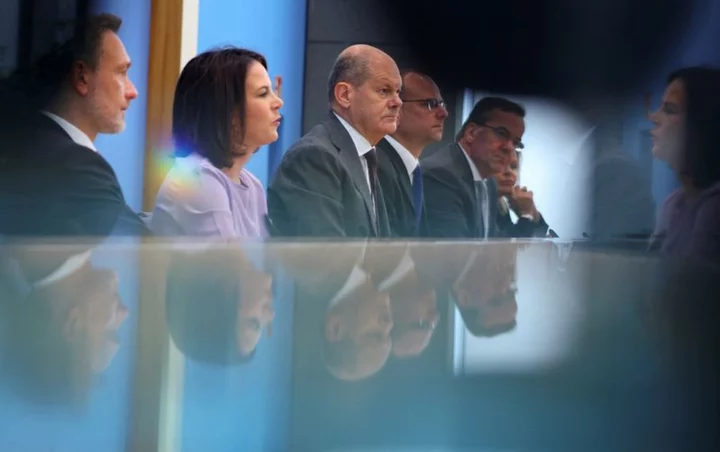
Factbox-Germany announces first National Security Strategy
BERLIN Germany enshrined a NATO commitment to spending 2% of its gross domestic product on defence and identified
1970-01-01 08:00
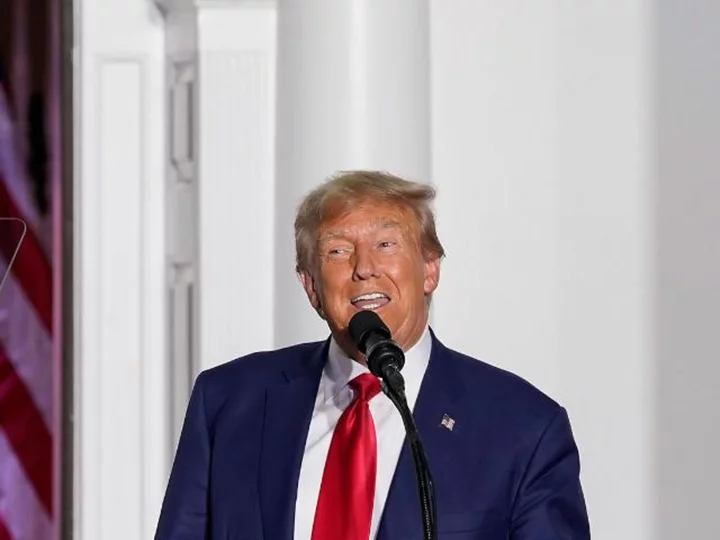
As Trump rails at prosecutors, his 2024 GOP rivals flail for a message of their own
Former President Donald Trump delivered a blunt message to Americans on Tuesday night, speaking outside his New Jersey club hours after pleading not guilty in a Miami courtroom to a vast and damning federal indictment.
1970-01-01 08:00
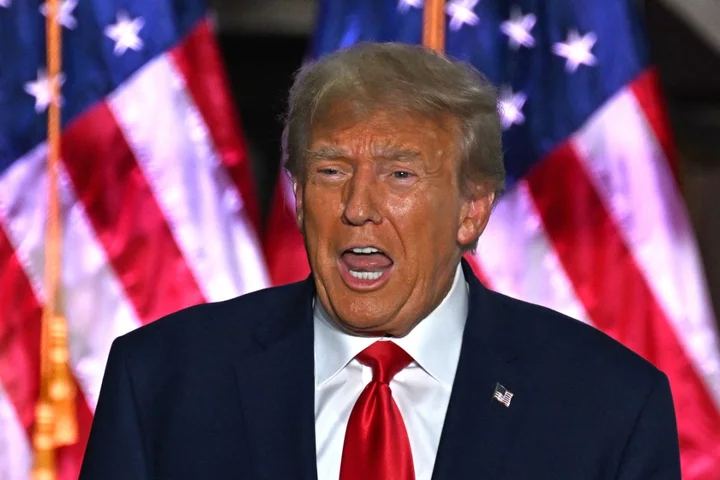
Defiant Trump accuses ‘corrupt’ Biden of undermining democracy with ‘evil and heinous’ federal charges
Hours after he was criminally charged in a federal courtroom in Miami, Donald Trump returned to his New Jersey club to deliver a barrage of false statements and declare his innocence in front of a throng of supporters. The former president, who has routinely used his platforms to project allegations he faces toward his political enemies, lambasted the federal case against him as “the most evil and heinous abuse of power” under President Joe Biden, who Mr Trump falsely suggested was responsible for charging him. “This day will go down in infamy and Joe Biden will forever be remembered as not only the most corrupt president in the history of our country but perhaps, even more importantly, the president who together with a band of his closest thugs, misfits and Marxists tried to destroy American democracy,” Mr Trump said from his golf club in Bedminster on 13 June. Mr Trump – who is formally charged with illegally retaining highly sensitive national defence documents and conspiring to obstruct government efforts to retrieve them for months after he was no longer president – has admitted that he possessed the documents he is accused of withholding, while falsely characterising the laws that govern them by stating that “whatever documents the president decides to take with him, he has the right to do so.” He falsely characterised the classified documents in his possession as his “own presidential papers” and his “own documents”. Dismissing the decades-long prison sentence he could face if convicted, he falsely said that ”just about every other president” also removed papers from the White House in the same manner. A former president accused of hoarding hundreds of classified documents, disclosing them to others and storing them haphazardly was out of the courthouse and visiting a restaurant in Miami within two hours of his arrival before he boarded a private plane to one of his many resorts and cast himself as the most persecuted man alive. After his arrival at his golf club’s outdoor stage, he absorbed the crowd’s applause while a sound system blasted Lee Greenwood’s “God Bless the USA”. Moments later, the crowd sang him “happy birthday.” His 30-minute remarks relied on a familiar tactic: denying wrongdoing, claiming that federal authorities are selectively prosecuting, then blaming his rivals – including Mr Biden and Bill and Hillary Clinton – for allegedly doing the same or worse. Mr Trump defended his actions under the Presidential Records Act, which the National Archives and Records Administration clarified last week “requires that all records” from presidents and vice presidents be turned over to the agency at the end of their administration, and that an outgoing president is required to separate personal documents from such records before leaving office. He closed his remarks by repeating a familiar refrain, arguing that his own criminal cases are evidence of a Democratic conspiracy against his supporters. “They want to silence me because I will never let them silence you,” he said. “I am the only one that can save this nation.” Mr Trump allegedly broke the law dozens of times by withholding top-secret documents at his Mar-a-Lago estate months after he left the White House in January 2021, then lied to a grand jury and federal agencies trying to recover them them – accusations detailed in a sweeping indictment following a special counsel investigation under the US Department of Justice. Last week, a grand jury in Florida voted to recommend charges against the former president, who now faces years in prison if convicted. He has pleaded not guilty. He has repeatedly rejected any charges and investigations against him in several jurisdictions as political “witch hunts,” pointing to the Democratic majorities in New York City – where was found liable for sexual abuse, hit with a $250m lawsuit from the state attorney general, and criminally charged with more than 30 counts of falsifying business records – and Atlanta, where his efforts to subvert the outcome of the 2020 presidential election are expected to result in state charges this summer. The historic charges against the former president raise the prospect of a potential presidential candidate facing at least two criminal cases in state and federal courts. His arraignment in federal court comes roughly three months after prosecutors in Manhattan criminally charged the former president with 34 counts of falsifying business records in connection with so-called hush money payments he reportedly arranged to suppress stories about his alleged affairs. He similarly returned to his Mar-a-Lago property hours after his Manhattan criminal court appearance. In his remarks from his estate that night, he lambasted New York County District Attorney Alvin Bragg and the judge overseeing the case, as well as the judge’s family members, and continued his narrative of political persecution. In his remarks from New Jersey, he also took aim at Jack Smith, the independent special counsel appointed by US Attorney General Merrick Garland to head up investigations into the former president. “He looks like a thug,” he said of Mr Smith, who was in federal court with Mr Trump hours earlier. “He's a raging and uncontrolled Trump hater, as is his wife, who also happened to be the producer of that Michelle Obama puff piece.” (Mr Smith’s wife, Katy Chevigny, is a documentary filmmaker who produced 2020’s Becoming.) The New York and Florida cases are separate from the Justice Department probe into Mr Trump’s role in the events surrounding January 6 and a Georgia prosecutor’s investigation into his attempts to subvert the outcome of the 2020 election in that state, among many of the mounting legal challenges facing the former president as he seeks the 2024 Republican nomination for another shot at the White House. Mr Trump remains the frontrunner for the GOP nomination, and he has insisted that he will remain in the race regardless of any outcome in the cases against him. He has relied on the investigations and indictments to raise money for his campaign, which netted millions of dollars in the days after charges were announced in his New York case. But the timeframe for the federal investigation – and, potentially, other pending cases that could result in criminal charges this year – could complicate his campaign ambitions. A first debate among Republican candidates is set for 23 August. A trial for the New York attorney general lawsuit targeting Mr Trump, his adult children and his business is slated to begin in October. And he is scheduled to return to Manhattan Criminal Court on 25 March – days after voting begins in primary states. Read More Trump indictment – live: Trump denounces ‘evil and heinous’ arraignment in address to fans at golf club How Trump’s second indictment unfolded: A timeline of the investigation into Mar-a-Lago documents
1970-01-01 08:00
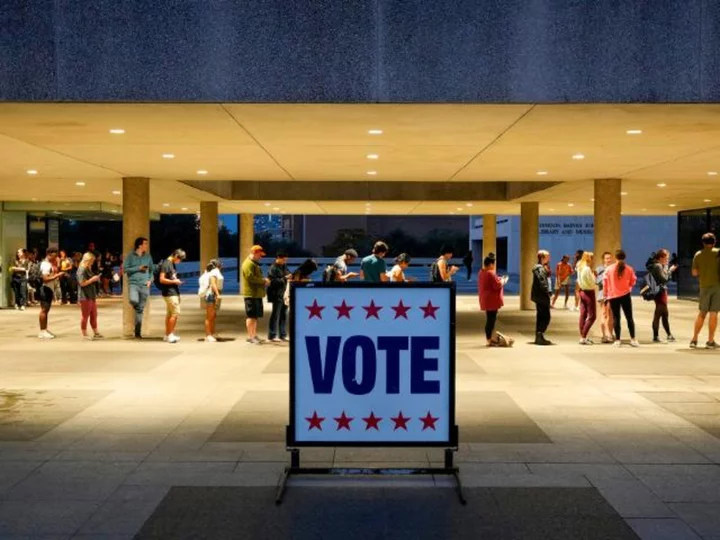
At least 11 states have enacted restrictive voting laws this year, new report finds
At least 11 states have enacted 13 restrictive voting laws this year, according to a new analysis from the liberal-leaning Brennan Center for Justice at New York University's law school.
1970-01-01 08:00
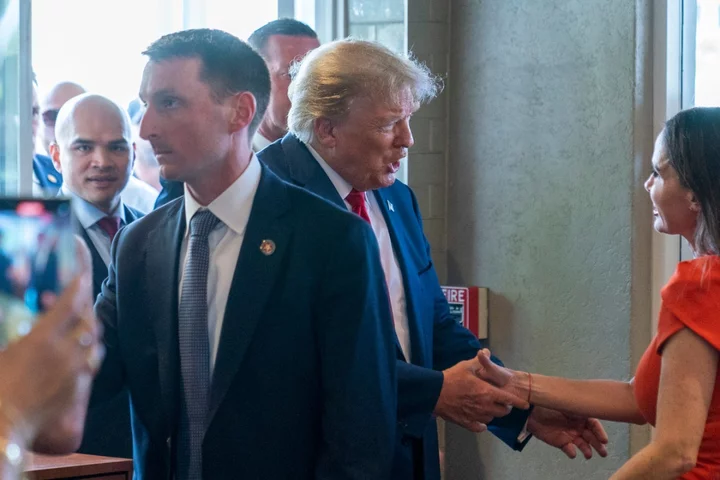
Who is Walt Nauta? Donald Trump’s ‘body man’ charged over classified documents
While all eyes were on Donald Trump’s arraignment on federal charges of mishandling top secret material at a Miami courthouse on Tuesday, a personal aide who was virtually unknown just days ago sat beside him in the dock. Walt Nauta, 40, is charged alongside his longtime boss and alleged co-conspirator with helping to conceal some of the nation’s most sensitive documents from federal investigators. He was arrested, fingerprinted, and unlike Mr Trump, had his mugshot taken ahead of the arraignment. Mr Nauta did not enter a plea to six charges during the brief appearance, including conspiracy to obstruct justice, corruptly concealing a document or record and making false statement. This was apparently due to him not having an attorney who was sanctioned to enter a plea for him in Florida. Mr Nauta became a trusted figure within Trump’s inner circle during seven years of service, stretching from the beginning of his presidency until the present day. According to an indictment unsealed on Friday, he allegedly moved boxes containing classified material from the White House to the ex-president’s Florida home and then lied about it to investigators. Beyond Mr Trump’s orbit, Mr Nauta’s name was known only to a few seasoned political observers and until a few days ago. He now finds himself in the centre of the most high profile criminal investigation in the country, his fate likely resting in the hands of a man who has shown little loyalty to associates who find themselves in legal jeopardy. Who is Walt Nauta? Waltine Torre Nauta, 40, was born in the US territory of Guam in the Western Pacific, and grew up one of six siblings in the small village of Agat, according to the Washington Post. Most of the inhabitants of Agat are Chamorros, the indigenous population of Guam, and a large US naval base is near by. He enlisted in the US Navy in 2001, where he worked primarily as a cook. From 2012 to 2021, Mr Nauta served in the Presidential Food Service in Washington DC, according to his service record. The unsealed indictment listed him as a “valet”, and he’s also been described as Mr Trump’s “body man”, an assistant who follows a political leader around the clock carrying out whatever tasks he may need. In Mr Trump’s case, this would reportedly involve bringing him Diet Cokes on a silver platter when he pressed the presidential call button on the Resolute desk in the Oval Office. Mr Nauta was also constantly by his boss’s side during domestic and foreign trips. When Mr Trump’s term ended in disgrace after the January 6th riots, Mr Nauta was one of the few White House staff members who followed his boss to Mar-a-Lago. He would travel with the former president to his private Bedminster golf club in New Jersey, and to campaign rallies and press conferences. Mr Nauta reportedly earned a salary of $135,000 for his labours. ‘Key witness’ Mr Nauta earned a reputation as someone who could stay out of the bitter fights between Trump staffers, according to a Washington Post article in March that identified him as a “key witness” in the classified documents probe. It was only when the Justice Department unsealed a 49-page indictment last Friday, that the extent of his alleged involvement in concealing the documents became apparent. Mr Nauta is alleged to have helped a maintenance worker move boxes of classified materials from Mar-a-Lago after a subpoena had been issued, and prior to an FBI raid last August. Mr Nauta initially denied knowledge of classified materials being kept at Mar-a-Lago when questioned by investigators. However after surveillance footage seized by the FBI apparently contradicted his account, Mr Nauta reportedly admitted in a second interview that he had moved boxes at Mr Trump’s direction. He later stopped cooperating with investigators, according to CNN. In an interview in March with the Post, his aunt Elly Nauta said he had kept his immediate family informed about the Justice Department investigation. “He told his mom there’s nothing to worry about. He didn’t do anything wrong. All he was instructed was to put the boxes where they were supposed to go,” his aunt told the Post. The few pictures that exist of the pair together appear to show a natural rapport between the two men. In images captured in March, Mr Nauta was seen disembarking from the former president’s private plane and into a black Suburban carrying papers and a black bag. Two months later, the soft spoken aide was pictured adjusting the ex-president’s collar at an LIV Golf Pro-Am golf tournament at the Trump National Golf Club in Sterling, Virginia. ‘A wonderful man’ Mr Trump’s attorneys, accountants, aides and family members have found themselves entangled in the estimated 4,000 investigations he’s been embroiled in over the course of his business and political career. Longtime fixer Michael Cohen was sentenced to three years in federal prison for helping to arrange hush money payments in the lead up to the 2016 election. Allen Weisselberg, the Trump Organization’s former chief financial officer, served three months in Riker’s Island after he pled guilty to accepting $1.7m in untaxed compensation. And three of Mr Trump’s children have been jointly accused alongside him in a $250m lawsuit of perpetrating what some observers dubbed “the art of the steal” through a litany of fraudulent business practices by the New York Attorney General’s office. In a Truth Social post on Friday, Mr Trump criticised what he called the “‘Thugs’ from the Department of Injustice” for indicting a “wonderful man”. He described Mr Nauta as a member of the US Navy, “who served proudly with me in the White House, retired as Senior Chief, and then transitioned into private life as a personal aide”. Mr Trump said that federal investigators were “trying to destroy his life”. Early on in the criminal process, Mr Nauta appears to be unmoved in his support for Mr Trump. According to the Post, his legal fees are being covered by the Trump-aligned Save America PAC. Because he did not have legal counsel in Florida at the time of the arraignment, he was unable to enter a plea and must do so at a later date. Several of the charges he is facing carry maximum sentences of 20 years in prison. Read More Trump indictment – live: Trump claims boxes of classified papers actually held clothes in post-arrest speech Mike Pence has sudden change of heart over Trump classified documents: ‘I can’t defend it’ Desperate deflections, revenge plans – and a supplicant Fox News: What we learned from Trump speech Ivanka and Jared split over attending Trump 2024 launch – follow live Why was Donald Trump impeached twice during his first term? Four big lies Trump told during his 2024 presidential announcement
1970-01-01 08:00
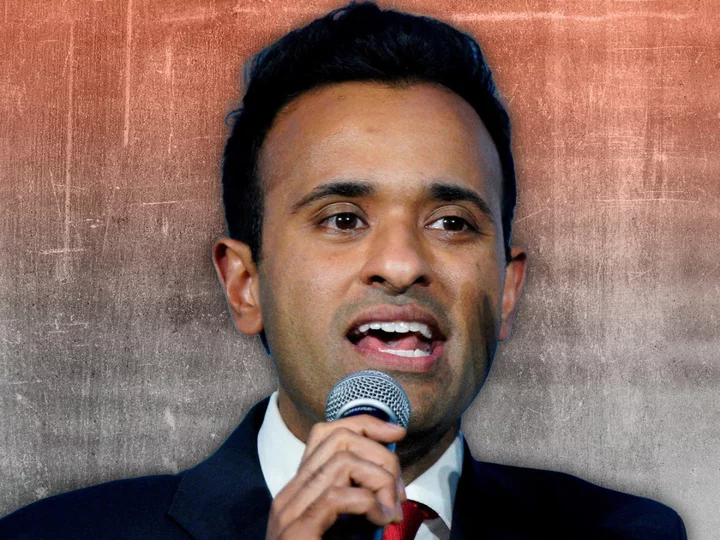
Bio-tech mogul Vivek Ramaswamy thinks his anti-woke 2024 campaign can beat both DeSantis and Trump. Is he in over his head?
When he announced his campaign for president in February, it may have been easy to dismiss Vivek Ramaswamy’s unlikely candidacy as a vanity bid put on by a rich man looking to raise his profile, position himself for a Cabinet slot or build a mailing list for a future run for a less-prestigious office. Many of the GOP insiders The Independent spoke to before heading to New Hampshire to cover Ramaswamy had kind things to say about his anti-woke, anti-Environmental, Social and Governance crusading, but were reluctant to say he was more than another rich guy cosplaying as a political candidate. While he does fit that mould, upon a cursory examination, it’s much harder to dismiss Ramaswamy once you see him campaign. One of his first major appearances as a political candidate — a speech at the 2023 Conservative Political Action Conference at a Prince George’s County, Maryland convention centre — demonstrated his undeniable political oratory skills. He had announced his presidential campaign only a week or so earlier, and was given a mid-afternoon speaking slot commensurate with his status as a newcomer who’d never before held office. The first-time candidate used his 15 minutes on the CPAC stage to work the relatively paltry crowd into a frenzy, garnering rounds of applause as loud and enthusiastic those observed for far more popular figures in the conservative political-media universe. He threw out red meat zingers about dismantling the FBI and ending affirmative action on “day one” of his administration, but he also talked about the “national unity” Republicans could achieve by winning such an overwhelming landslide in next year’s election that they could run roughshod over whatever Democratic rump remained in Congress. The crowd at CPAC lapped it up, and while he hasn’t reached a level of support that would enable him to make a serious challenge to Mr Trump, in recent opinion polls his support has equaled or bettered that of more well-known figures, including former Vice President Mike Pence and ex-New Jersey governor Chris Christie. He trails behind Florida Gov Ron DeSantis, but is hoping to make inroads as the campaign progresses. At least two GOP campaign operatives suggested at different times that his campaign is a manifestation of pro-Trump intraparty sabotage — an operation meant to further split the Republican field to the ex-president’s benefit. He was even asked about this possibility at one of his events. He denied it, of course, and it’s hard to see why he’d go through the trouble of putting together a full campaign team, dumping a seven-figure sum from his own pockets into his campaign’s coffers, and put himself out there just to benefit another candidate — especially one who is known not to return favours or have much loyalty to anyone but himself. There was a time, not long ago, when the idea of a 37-year-old without a day of experience in elected office making a run for the highest office in the land would have been written off as the stuff of delusion — or at best, a pitch for a Saturday Night Live skit. For better or worse, Donald Trump’s ascent from reality television host to the summit of American power seems to have permanently upended the notion that experience and traditional qualifications for office are what voters crave in their chief executive, leading to an influx of wealthy gadflies and other long-shots making their entries into presidential politics in hopes of replicating his unlikely journey. “I don’t think that we all say let’s show up at the 50 yard line, hold hands, compromise, sing Kumbaya, and that’s how we get on with it” Vivek Ramaswamy With an estimated net worth of roughly $630m — gained largely from a string of investments in pharmaceutical and biotechnology startups — Ramaswamy certainly qualifies as uber-wealthy. He has been a fixture on Fox News and other right-wing networks during the Biden era, and he’s made a name for himself as a crusader against all things “woke” through a string of books lambasting efforts to tackle racism and increase diversity in the corporate ranks, as well as “stakeholder capitalism” and the use of ESG criteria by investors and asset managers. His campaign has been prolific in online fundraising, and when the Republican National Committee announced debate participation criteria that requires candidates to garner donations from more than 40,000 individuals, he easily met that threshold. And while he may be caught in Mr Trump’s shadow this time, he clearly possesses some raw political abilities that could serve him well should he choose to remain in electoral politics after this election cycle. At a New Hampshire diner, it was clear that Ramaswamy, whose middle-class upbringing in Ohio gave way to elite education at Harvard University and Yale Law School, knew how to work the room. Both on the stump and in one-on-one conversations, he projects preternatural confidence, rattling off complex answers about his view of how he’d govern as president. He laced his remarks with a far more positive air than the GOP frontrunner, who constantly claims that America without him at the helm is “a nation in decline”. Though he hardly ever mentioned Mr Trump’s name, Ramaswamy took direct aim at the ex-president’s pessimistic outlook on the United States, telling the diner crowd that he doesn’t believe that description has to fit America. Instead, he describes the country he wants to lead as “going through adolescence” with the accompanying crises of self-confidence. “I really think we’re just a little young, actually, as a country, going through our own version of adolescence, figuring out who we’re really going to be when we grow up … You go through adolescence, you go through an identity crisis, you go through self doubt, you lose your confidence. You lose your sense of who you are. But we get to adulthood stronger on the other — I think where we are as a country, I don’t think we have to be in decline. I think we might be in our ascent,” he said. Yet for all his optimism and self-confidence, the first-time candidate also showed signs that he may be in over his head. Ukraine ‘peace’ plan Ramaswamy’s predilection for right-wing rhetorical tropes over a solid command of the facts became further evident when the topic of discussion turned to the reason Ramaswamy’s campaign had invited The Independent to ride along with him in New Hampshire: His plan to end Russia’s war against Ukraine. That conflict, the worst land war on the European continent since the defeat of Nazi Germany, is, according to most experts, one born out of Russian President Vladimir Putin’s arrogance and epic miscalculations of how the West would respond to an all-out effort to topple the pro-western government in Kyiv. While those on the more traditional side of the Republican Party field such as Pence and former South Carolina governor turned UN Ambassador Nikki Haley, have been steadfast supporters of US efforts to bolster Ukraine’s defence forces, Ramaswamy’s more populist instincts have him hewing closer to the side of Trump, who, as the invasion kicked off last year, praised Mr Putin’s aggression as “genius”. The basic premise of his “peace plan” is that the US should somehow force Ukraine to accept massive territorial concessions from Russia, and at the same time induce Russia to exit its longstanding relationship China and make some other concessions in exchange for control of a big chunk of Ukraine and sanctions relief. Ramaswamy claims this plan would cleave in two what he describes as a mutual defence pact between Moscow and Beijing based on a two-decade-old “Treaty of Good-Neighbourliness and Friendly Cooperation” between the two countries and the “no limits” partnership Putin and Chinese leader Xi Jinping announced early last year. Yet neither the decades-old Sino-Russian agreement nor the five-year extension of it announced by Putin and Xi last year amount to a Nato-style defence agreement in the mould of the North Atlantic Treaty, despite Ramaswamy’s claims to the contrary. He also suggests that in exchange for the sanctions relief and formalised control over Crimea and the Donesks region of Ukraine, Russia would be induced to cease its use of Kaliningrad, a small exclave on the Baltic Sea between Poland and Lithuania, for basing nuclear-capable weapons systems. One Russia expert who spoke to The Independent actually laughed out loud when asked about the topic of Kaliningrad. The expert noted that the city is the home base for Russia’s Baltic Fleet, the country’s only ice-free seaport, and part of the hard-won spoils awarded to the Soviet Union after the Second World War. The longtime foreign policy scholar, who asked not to be identified because they don’t want to get pulled into GOP primary politics, said the mere suggestion that Russia would ever give up Kaliningrad calls into question whether Ramaswamy has thought through his plan or ran it by any actual experts before going public with it. I don’t know the answer to that question Vivek Ramaswamy The Independent followed Ramaswamy over the course of his three morning events. He embodies a particularly Trumpian archetype — a charismatic, telegenic personality with an Ivy League pedigree and raw political talent who, upon closer examination, appears to have bitten off more than he can chew. During a brief interview with a correspondent from CBS News who had come to Concord, New Hampshire, for his second event of the day — a roundtable with New Hampshire legislators — Ramaswamy drew attention to another part of his plan. He told CBS that part of the Western end of the deal would be for the US to announce an end to “any military aid to Ukraine or even former Soviet Union bloc states”. Ending aid to Ukraine puts him firmly in the Trumpian part of the GOP field, but the second part of his statement raised eyebrows for a different reason. In the three decades since the fall of the Soviet Union, the vast majority of former Warsaw Pact countries have elected to become full members of Nato. Ramaswamy’s off-the-cuff remark to CBS went even further than what he’d suggested in prepared remarks, which indicated that he planned to call for Nato to pull back from bases in Eastern Europe that had been built up in the years following Russia’s illegal invasion and annexation of Crimea in 2014. As we left the Concord hotel where his campaign had reserved the room for the legislator roundtable, The Independent asked who had advised him when he was formulating his Ukraine policy. He said “the thesis” of the proposal came “from him,” but he also suggested that there were others involved, but he declined to name any of his foreign policy advisers, citing concerns for their privacy. Back in the SUV and en route to his third morning event, this reporter pointed out to him that he had essentially called for the United States to abandon mutual defence commitments to nations that were members in good standing of Nato. At first, he appeared not to understand the question. When The Independent explained that most of the former Soviet Bloc nations are now part of the 31-member defensive alliance, he attempted to walk back his call for the US to abandon those countries and said he had been “just speaking fast” during his interview. He said that what he meant to say was that the US should stop aid to “former Warsaw Pact countries that are not part of Nato,” even though the only signatory to that defunct treat that has not joined Nato is Russia, the successor to the Soviet Union. The vision he was articulating — a wholesale abandonment of Ukraine as a way to appease Russia and induce Moscow to break from its partnership with China — may not have made complete sense in terms of the details, but it became clear as The Independent followed Ramaswamy throughout the day that his intended audience isn’t foreign policy gurus or detail-obsessed journalists. At every stop, each time he mentioned the idea of giving up support for Ukraine as a wedge against China, he was greeted with applause. War against ‘the administrative state’ Over the course of the day, the Yale Law School graduate repeatedly offered his take on how to address the most Trumpian of boogeymen, a freedom-sucking villain he calls “the administrative state”. For years, Republicans have railed against the very idea of a nonpartisan civil service, staffed by career professionals who, like all federal officials, swear to “support and defend the Constitution of the United States”. In the last days of the Trump administration, the outgoing president even proposed to create a new category of federal employee who could be fired at will and move tens of thousands of career experts, scientists, and anyone with a role that so much as touches policy formulation, into that category so they could be fired and replaced with loyalists. More than one GOP candidate in the 2024 primary has suggested reviving that proposal, known as Schedule F. But Ramaswamy wants to go even further. In almost every public appearance, he says he will “eliminate” the Department of Education and other federal agencies that are viewed as enemies of the conservative movement, including the FBI and much of the rest of the federal intelligence and law enforcement apparatus. One aspect of his plan would be somehow ditching the century-old civil service laws in favour of establishing an eight-year “term limit” for federal employees, a category that could encompass anyone from the National Park Service groundskeeper who cuts the grass at the White House, to the people who process Social Security applications and cut the checks, to the IRS employees who make sure Americans get their tax refunds on time. But to Ramaswamy, they’re “bureaucrats” who need to be reined in from acting as a “fourth branch of government,” even though most federal agencies operate under the supervision of one or more Senate-confirmed appointees who are named by the President himself. In Ramaswamy’s view, only when the US president has unilaterally eliminated the nation’s top law enforcement agency and the agency responsible for writing safety regulations for nuclear power plants can America “stand up with a spine” to “actual threats” on the world stage. Also ripe for a root-and-branch uprooting, he says, is the “managerial class” at the Pentagon, who he blamed for “wokeness” in a military he described as “failing”. When this reporter finally had a chance to ask him about the legal underpinnings of his plans to gut the majority of the federal government, his reply opened up even more chilling possibilities. He first opined that the Supreme Court’s landmark 1984 opinion in Chevron U.S.A., Inc. v. Natural Resources Defense Council, Inc — which states that courts should defer to federal agencies’ interpretations of ambiguous federal statutes – was “wrong,” a not uncommon belief among Trump-era conservatives who’d like agencies to have less power to enact regulations they dislike. But he quickly went even further, telling The Independent that the Chevron decision has become “an excuse for sidestepping the nondelegation doctrine” and opining further that Congress “legislate lawmaking authority to an administrative agency”. In essence, what Ramaswamy was saying is that most — if not all — federal programmes and laws enacted since the Supreme Court stopped using nondelegation in 1935, are unconstitutional. Taken at face value, this would mean much of the federal infrastructure we take for granted, including the Federal Reserve, New Deal creations such as Social Security, the Federal Deposit Insurance Corporation, and the Securities and Exchange Commission, would simply vanish if he had his way. When asked if his aim was to “party like it’s 1934” — a reference to the last time the high court struck down a statute using the non-delegation doctrine, he replied: “I do, but maybe even earlier, like 1922”. The Independent pressed him to elaborate further by asking if he was saying that he wants to roll back the entire New Deal — the architecture on which the modern United States was built. He said rolling it back was his “domestic policy priority”. “And more than that, the legacy of it — the Great Society thereafter … set into motion its own metastasis of the administrative state,” he added, referring to the suite of Lyndon Johnson-era programmes including Medicare, Medicaid, and host of other federal initiatives that were enacted as part of Johnson’s War on Poverty. What Ramaswamy was proposing would be the fulfillment of a dream held by Republicans going back nearly a full century, to when the Supreme Court’s “switch in time that saved nine” stopped getting in the way of Franklin Delano Roosevelt’s economic programmes. Trump, who spent much of his presidency railing against the “deep state” and trying to expand the limits of executive power far beyond what had ever been considered, had made an attempt to downsize the government through consolidating a few executive departments and eliminating the Office of Personnel Management — the independent agency charged with overseeing the civil service. But even Trump knew he had to do these things lawfully. His GOP allies in Congress introduced legislation to carry out the executive branch reorganisation he desired. It went nowhere, thanks to resistance from members of both parties in the House and Senate. Perhaps with that failure in mind, Ramaswamy wants to go further. In his view, the problem starts when Congress writes the federal budget each year. At multiple points during the day, he told Granite State residents how the “administrative state” somehow brought about a fiction that when Congress appropriates funds, these funds have to be spent. He also said he’d force departments to run their annual budget requests through the White House — perhaps not knowing that the budget request process has for decades been run through the White House, by way of the Office of Management and Budget, which is part of the Executive Office of the President. In his hypothetical administration, all this could be solved by changing the word “shall” in budget bills to “may,” leaving the choice of whether to spend any money to run entire departments up to him, and him alone. Barring that, he claimed that long-expired reorganisation powers last granted to Ronald Reagan could be revived somehow through executive fiat, and he said firing the entirety of the Department of Education could be done without running afoul of civil service laws if he only were able to eliminate agencies by decree — with the support of a 6-3 GOP-appointed Supreme Court. The Independent asked him if he was explicitly stating that the court would give him the power to nullify entire swaths of the United States Code laying out the structure of the Executive Departments — whole swaths of the government with histories dating back to the Washington Administration. After a long pause, for the first time that day, this reporter saw something previously unseen creep into view on Ramaswamy’s face: Doubt. “I don’t know the answer to that question,” he said.
1970-01-01 08:00

Supreme Court could soon rule on Biden's student loan forgiveness program. Here's what borrowers need to know
Millions of borrowers may learn soon whether they could receive up to $20,000 in debt relief under President Joe Biden's student loan forgiveness program. The fate of the debt cancellation program lies with the Supreme Court, which is expected to rule in late June or early July.
1970-01-01 08:00
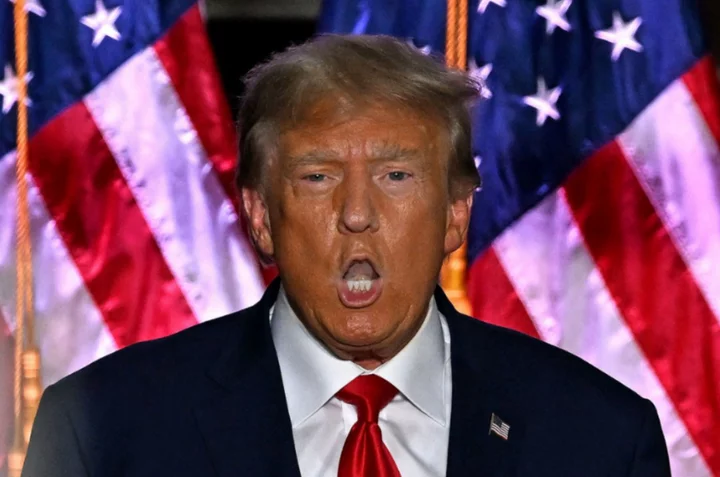
Trump indictment – live: Trump claims boxes of classified papers actually held clothes in post-arrest speech
Donald Trump has now claimed that the boxes of classified documents discovered in his possession actually contained clothes in his first speech since he was arrested and arraigned on federal criminal charges. In remarks at his golf club in Bedminster, New Jersey, on Tuesday night, Mr Trump insisted that he wanted to hold onto the boxes because “they were containing all types of personal belongings – many, many things, shirts and shoes, everything”. He insisted he wanted to sort through the boxes but had been “busy” as he went on his usual unsubstantiated narrative that he is the victim of political persecution. His speech came hours after he pleaded not guilty at his arraignment in a Miami federal courthouse on 37 charges over his handling of classified national security documents after leaving the White House. Miami officials had braced for protests outside the courthouse but much of the Maga army of supporters failed to show up as expected. One anti-Trump protester jumped in front of the former president’s motorcade. After the hearing, Mr Trump stopped by the famous Cuban restaurant Versailles where supporters sang him ‘Happy Birthday’ ahead of his 77th birthday today. Read More Desperate deflections, revenge plans – and a supplicant Fox News: What we learned from Trump speech Defiant Trump accuses ‘corrupt’ Biden of undermining democracy with ‘evil and heinous’ federal charges Trump addresses reason he refused to give back boxes saying they contained ‘shoes and shirts and everything’ Tucker Carlson blasts ‘filthy and decadent’ Trump aides who exploited his need for flattery
1970-01-01 08:00
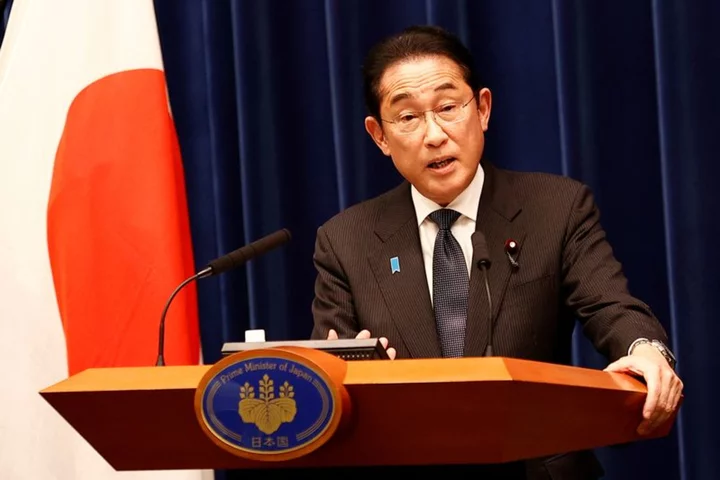
Why Japanese Prime Minister Kishida may call a snap election soon
By Elaine Lies TOKYO Japanese Prime Minister Fumio Kishida is thought increasingly likely to call a snap election,
1970-01-01 08:00
